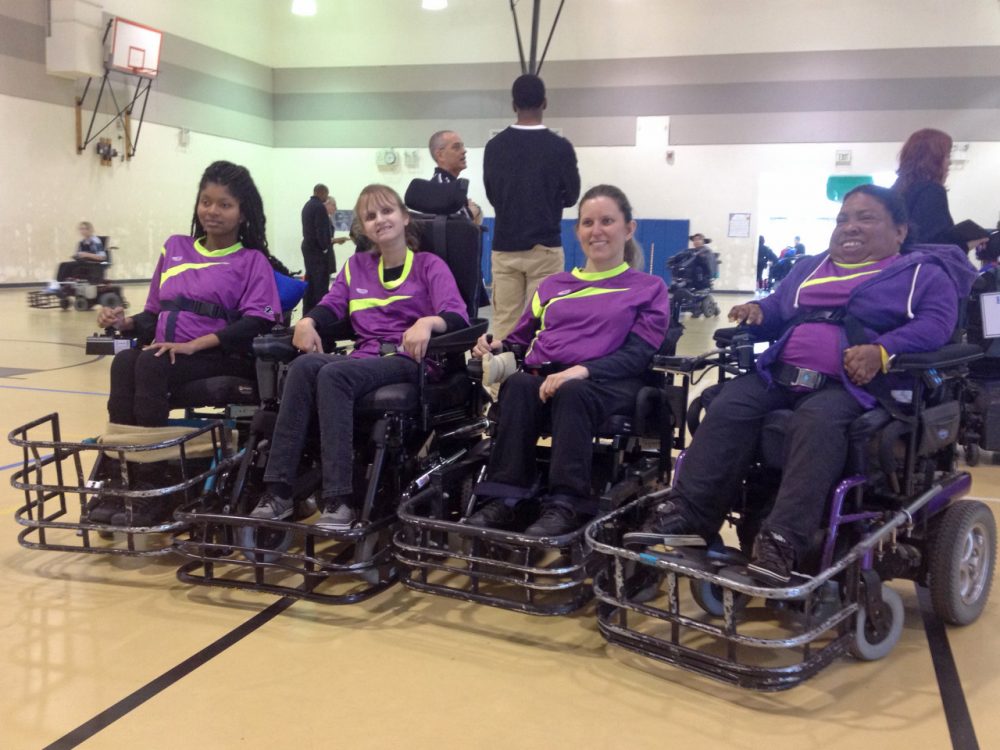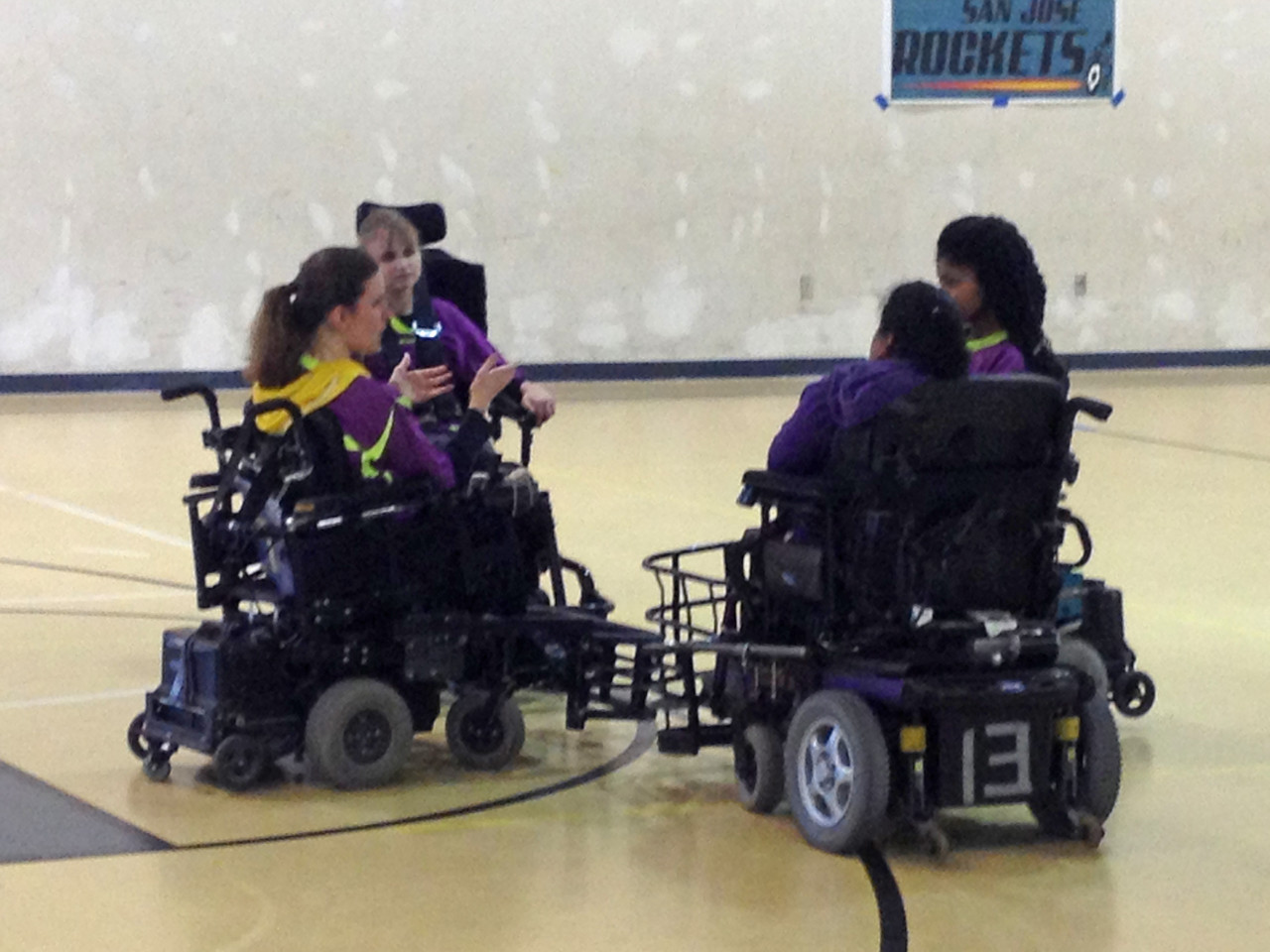Advertisement
'Power Soccer' Puts Wheelchair Athletes Into The Game
Resume
Sitting on Chris Finn's desk in his home in San Leandro, Calif., is a piece of sporting history. It's a trophy, about a foot tall, and looks kind of like a metal flame rising up and encircling the globe.
“This is the actual World Cup, sitting on my desk,” Finn said, laughing.
But this isn't the FIFA World Cup. This is the “FIPFA” trophy. The “P” is for “Powerchair.”
“In the rest of the world they call it power chair football. The U.S. always has to be different,” Finn said. “I think power soccer sounds more cool.”
"Some players may only be able to move two fingers instead of running up and down the court, but as the Yellow Pages say: Let your fingers do the walking."
Chris Finn, U.S. Power Soccer coach
This is probably the only time I will ever get to lift a World Cup – for power soccer, or otherwise – but Finn has coached the US national team to win two of them, and the Copa Americas tournament. As a kid, he dreamed of being the next Pele.
“I've been a big sports person my whole life, before my injury and after my injury in 1992 when I was 21 years old," Finn said. "I couldn't find a sport I could play as a C4-5 quadriplegic. I went down to the wheelchair basketball court and they kicked me off because I [didn’t] have a manual chair I could push!”
Over on a basketball court in San Jose, Calif., two teams of four players are using motorized wheelchairs to spin, push, and hit a beach ball-sized soccer ball around a court and into the opposing team's goal. Like the chairs the athletes use, this game is electric.
“Power soccer is the same as outdoor soccer, it's just played in a power wheelchair,” Finn explained. “Some players may only be able to move two fingers instead of running up and down the court, but as the Yellow Pages say – let your fingers do the walking – and that's all you really need to control the joystick to play the game.”
At courtside, goalkeeper and coach Jessica Lehman is rallying her team, Kryptonite Pride, as they take on local rivals, the Bombers.
"You guys are looking good out there,” Lehman said. “Everyone's working hard. You guys are totally pushing the ball. you're keeping up the pressure. You're making them work.”
Lehman has used a wheelchair all her life. Before she came to power soccer, she'd never really been into sports, but in 2005 she went along to a local team practice.

“They said ‘do you want to try it?’” Lehman recalled. “And I said ‘No, no, I'm just here to watch.’ And I still felt like ‘I don't do sports. I just want to see this.’ So I watched for about half an hour. And my eyes got wider as I was watching, and so I said ‘OK, I'm ready to try it,’ and so they strapped a guard on my chair and I never looked back."
At the game in San Jose, a “pit crew” of friends and attendants works on the front of Nikki Brown-Booker's chair.
“It's a metal guard I use to hit the ball with,” Brown-Booker explained. “Some people have plastic guards but the metal guards are the best.”
“Sounds like the operating room!” Lehman laughed.
“I've taken some pretty hard hits with it, and I've hit some people a few times pretty hard, but mostly I’ve taken some hard hits,” Brown-Booker said. “They get beaten up a lot, because as you can see when you're playing and you're going for the ball and you're getting pretty aggressive you end up hitting some other players.”
As she's speaking, two players on the court both race for the ball, their metal guards colliding. Brown-Booker grew up in a sports-loving family, and power soccer has provided her a chance to take part.
“It was really nice to think that I as a person in a wheelchair could play sports and be really competitive,” she said. “As a matter of fact, the last team we played, my brother was in the car when we drove down to San Jose and he was like, 'Wow, you guys really take this game seriously.' And we were like, ‘Yes, it's a real sport for us and we definitely take it seriously.’”
Less than a year after she started playing power soccer, a couple of Jessica Lehman's teammates told her she should try out for the national team being put together for the first power soccer World Cup in 2007 in Japan.
“At first I thought, ‘How could I possibly try out? I just started playing,’ but they encouraged me to do it.” Lehman said. “They said, 'There's no harm trying out, you're a good player, you're going to get good training.' and I realized, ‘Alright, that sounds like fun. If they think I have a shot, why wouldn't I go for it?’”
Lehman was picked for the team and a year later she was on her way to Tokyo. At first, expectations of the U.S. team were low – but that changed.
“We played these teams from all over the world and [beat] them all,” Lehman recalled. “We came up against France in the final, and it came down to a penalty kick shootout. Just the stress of watching each penalty kick – I remember holding my teammate’s hand and squeezing so hard I thought we were both going to lose circulation.”
Chris Finn was the coach during that game.
“We were up first,” he remembered. “Took a kick, made it. France took a kick, made it. We took our second kick, made it. They took their second kick … and our goalie, J.C. Russo, blocks it.”
“I think because it was such an unusual experience in power soccer nobody was quite sure what had happened,” Lehman said. “There was a moment before people started cheering and we realized we had just won the World Cup!”
Back on the court in San Jose, Kryptonite Pride has won their game, but Brown-Booker is rueing a missed chance.
“Just next to the post. It was so close!” she said. “I tried to hit it back in and then they called the whistle.”
She's only been playing a couple of years, but Brown-Booker has ambitions to play in a World Cup someday. One World Cup was enough for Lehman, though. She hasn't returned to the national team since 2007, but she's still passionate about the sport.
“I know how much power soccer has changed my life for the better, so I would really love to see it spread,” Lehman said. “Every chance I have, if I see people in power chairs I talk to them about the sport. And it's always like, ‘Just come to the practice, we'll put a guard on you and try it,’ because I know that's enough. I know when people do that, they want to play.”
This segment aired on August 16, 2014.
